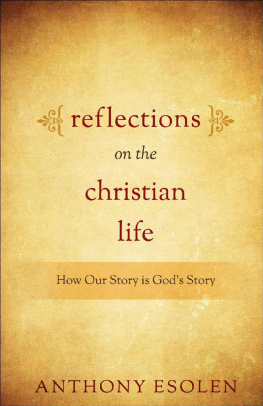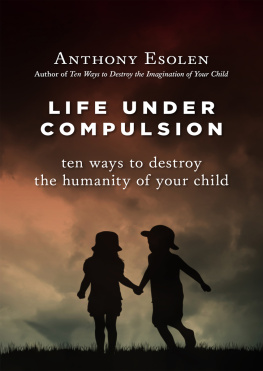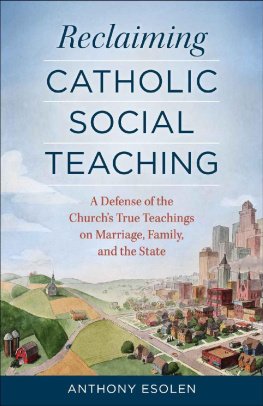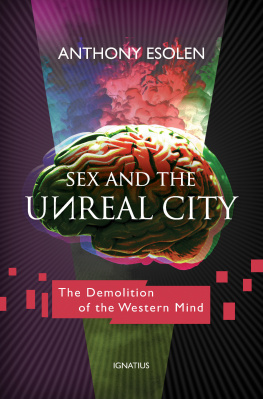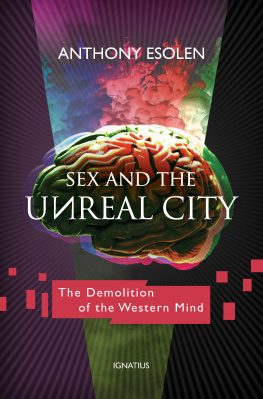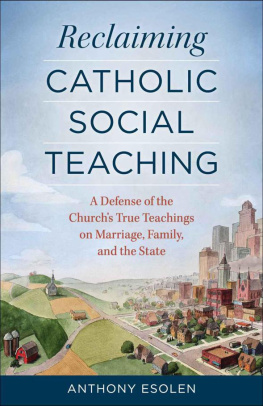Anthony Esolen - Reflections on the Christian Life
Here you can read online Anthony Esolen - Reflections on the Christian Life full text of the book (entire story) in english for free. Download pdf and epub, get meaning, cover and reviews about this ebook. year: 2013, publisher: Sophia Institute Press, genre: Detective and thriller. Description of the work, (preface) as well as reviews are available. Best literature library LitArk.com created for fans of good reading and offers a wide selection of genres:
Romance novel
Science fiction
Adventure
Detective
Science
History
Home and family
Prose
Art
Politics
Computer
Non-fiction
Religion
Business
Children
Humor
Choose a favorite category and find really read worthwhile books. Enjoy immersion in the world of imagination, feel the emotions of the characters or learn something new for yourself, make an fascinating discovery.
- Book:Reflections on the Christian Life
- Author:
- Publisher:Sophia Institute Press
- Genre:
- Year:2013
- Rating:4 / 5
- Favourites:Add to favourites
- Your mark:
- 80
- 1
- 2
- 3
- 4
- 5
Reflections on the Christian Life: summary, description and annotation
We offer to read an annotation, description, summary or preface (depends on what the author of the book "Reflections on the Christian Life" wrote himself). If you haven't found the necessary information about the book — write in the comments, we will try to find it.
Reflections on the Christian Life — read online for free the complete book (whole text) full work
Below is the text of the book, divided by pages. System saving the place of the last page read, allows you to conveniently read the book "Reflections on the Christian Life" online for free, without having to search again every time where you left off. Put a bookmark, and you can go to the page where you finished reading at any time.
Font size:
Interval:
Bookmark:
Anthony Esolen
Reflections on the
Christian Life
How Our Story
Is Gods Story
SOPHIA INSTITUTE PRESS
Manchester, New Hampshire
Copyright 2012 Anthony Esolen
Printed in the United States of America
All rights reserved
Cover design by Carolyn McKinney
Scriptural quotations are taken from the King James Version of the Bible.
No part of this book may be reproduced, stored in a retrieval system, or transmitted in any form, or by any means, electronic, mechanical, photocopying, or otherwise, without the prior written permission of the publisher, except by a reviewer, who may quote brief passages in a review.Sophia Institute Press
Box 5284, Manchester, NH 03108
1-800-888-9344
www.SophiaInstitute.com
Sophia Institute Press is a registered trademark of Sophia Institute
Library of Congress Cataloging-in-Publication Data Esolen, Anthony M. Reflections on the Christian life : how our story is Gods story / Anthony Esolen. p. cm. ISBN 978-1-933184-85-2 (pbk. : alk. paper) eBook ISBN 978-1-622821-50-11. Christian life. 2. Storytelling Religious aspects Christianity. I. Title. BV4501.3.E845 2013
248.4 dc23
2012037395
To my wife, Debra, and
my children, Jessica and David
Contents
Foreword
This book is an attempt to meditate upon the meaning of a Christian life insofar as it is a story, and as the story of the life of Jesus sheds light upon it. My qualifications to write such a work seem paltry enough. Im not a saint, I have had no private revelations, and I do not teach theology. If the reader wishes to enter most deeply into the life of the God-Man who walked the hills of Palestine twenty centuries ago, I should recommend Karl Adams The Lord, Edward Leens In the Likeness of Christ, G. K. Chestertons Everlasting Man, and Franois Mauriacs exquisite Life of Christ. All I can bring forth in my defense is my teaching of literature. I have spent many years introducing students to the works of the masters, Homer and Virgil, Aeschylus and Sophocles, Virgil and Ovid, Saint Paul and Augustine, Boethius and Aquinas, Dante and Chaucer, Shakespeare and Cervantes, Herbert and Milton, and many more. So I have had to think a great deal about what it means to live in a world of stories, and what makes the Christian narrative so distinct, fulfilling all that is true in the others, and surpassing them.
If I should say anything here that in any way strikes the reader as inconsistent with the plain meaning of the word of God, or with the teachings of the Church, or even with the advice and insights bequeathed to us by the saints, I beg him to forget what I say and forgive me my error. I dont wish to commit the sin of originality. But if these words can point one soul in the way toward the true Author and Judge of all, they will have done their modest work.
Reflections on the Christian Life
Chapter 1
At the Shores of Eternity
Some years ago a young man, intelligent and lonely, found himself in a European airport with a day and night to wait for his flight back to America. He was hungry and had no money. Then an older man sat beside him and engaged him in conversation. The older man saw that the lad had nothing to eat, so he offered him his ham sandwich. The man was a Catholic priest.
That young fellow, as it turned out, had never been baptized, but he was on a search for truth for what it means to be a good and fulfilled human being. He did not forget the priests act of kindness. A few weeks later, at the school where he was enrolled as a first-year graduate student, he attended a pulled-pork party thronged with fifty or sixty other English students and professors. Some of them were cheerfully indulging in a favorite pastime, singing old Appalachian hymns in shape-note harmony. That was when he tossed out the opinion that Saint Paul was a bigot, because of what he said about women not being chosen for the ordained ministry. A young Roman Catholic heard him, put down his plate, and took up the challenge to set him right.
What happened after that, Ill wait to tell. First I want to make an observation about time; for we cant appreciate fully what it means to live in a world of stories, unless we see what it means for God to be the Lord of time.
When Saint Augustine was a young pagan struggling to understand the truth about God, he had first to clear away his fleshly notion of what it meant that God should be everywhere. He thought, as the old Stoics did, that God was present throughout the universe, like air or light that fills a room, with more of God being in a big thing, such as the earth, and less of God being in a little thing, such as a grain of sand. He didnt see then that he had demoted God to the status of a creature, if even the greatest creature imaginable. It took him years he says this with honest embarrassment to conceive of just what God meant when He said to Moses, I AM. If God is the One Who Is, He cannot be divided into parts, or bounded by boundaries, or parceled out into more and less. That means not only that God is everywhere. It means that the fullness of God is everywhere, God in His infinity. G. K. Chesterton put it marvelously in a lyric poem. The speaker asks the wise men of the world whether they know what is in the smallest of the seeds. Scientists cant say, and philosophers cant say, but the believer sings out in wonder:
God Almighty, and with HimCherubim and seraphim,
Filling all eternity,
Adonai Elohim.
Thats something the secularists of our time cant or wont understand. When a Richard Dawkins, the rather silly atheist zoologist, conceives of God, he imagines some big creature tinkering with the laws of the universe at the onset of the big bang, turning knobs and pressing buttons so as to fine-tune everything to result in the world we know, the world with blue jays and mockingbirds, dogs and cats, puffy clouds in the sky, and grass beneath our feet. Then he says that it is absurd to suppose that such a creature exists. Well, it is absurd, because that imaginary creature is not God. First, God is not just big. He is infinite and omnipotent. It is easier for God to create a universe billions of light-years in its vastness than it is for me to add seven and three infinitely easier, for easy and difficult do not apply to God. That is one of the things the sacred author meant when he was inspired to write, And God said, Let there be light, and there was light (Gen. 1:3). Just like that; He spoke, and it came into being.
But second, God is not next to or outside of His world. He is present in His fullness everywhere. So it is not a matter of fine-tuning from a distance. In the wisp of a dandelion seed, what is there but God, all of Him, and the hosts of heaven singing His praises? In the dash of a photon along an optical fiber, what is there but God, all of Him, in His infinite act? He is not simply great because He comprehends the greatest of things. He is great also because He is comprehended by the smallest of things; and that too is a measure of His love.
Now what is true of God and objects in space is true also of God and objects in time. The Deists of the eighteenth century got themselves tangled up in error because they had a childish view of God. They often thought of Him as a creator, a kind of clock maker, who existed before the universe, who then fashioned this vast machine, and then let it run by itself. If they had read Augustine, they would have learned that there is no before and after with God, because it is God who created time to begin with. Just as God is present in His fullness in the most far-flung galaxy and in the tiniest of particles for the whole universe is as nothing to Him so He is present in His eternity in the most fleeting of moments, just as in the billions of years since the world burst into being. That is what Scripture means when we read, One day is with the Lord as a thousand years, and a thousand years as one day (2 Peter 3:8).
Next pageFont size:
Interval:
Bookmark:
Similar books «Reflections on the Christian Life»
Look at similar books to Reflections on the Christian Life. We have selected literature similar in name and meaning in the hope of providing readers with more options to find new, interesting, not yet read works.
Discussion, reviews of the book Reflections on the Christian Life and just readers' own opinions. Leave your comments, write what you think about the work, its meaning or the main characters. Specify what exactly you liked and what you didn't like, and why you think so.

